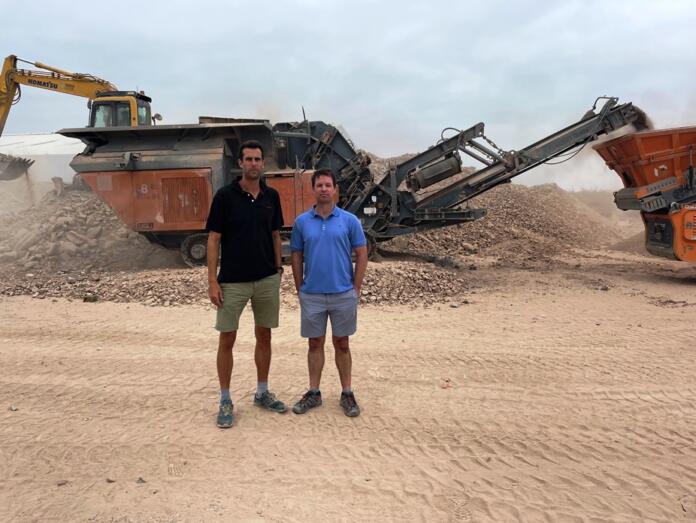WHILE rubble recycling in South Africa remains a notoriously challenging industry, Rubble Cycle is persevering against all odds to help drive the uptake of materials that have been manufactured from construction waste. Among the many challenges that participants in the industry face include an abundance of virgin aggregates from quarries that still have hundreds of years of mineable resources left and that are also very competitively priced. This is against a backdrop of rampant illegal sand mining and dumping of construction waste.
Since 2009, owners, John Wilson and James Ross, have been slowly growing markets for the various products that they produce from builders’ rubble. This includes a range of aggregates, such as a G7 filling sand, 19mm stone, kerb mix and -350mm Sandstone Rock. The company also produces a quality G5 sub-base material that it mainly uses for its own general civil-engineering construction projects, achieving a Mod AASHTO dry density of 107% for the various stands that it constructs for housing developments in-and-around the larger Cape Town area. The quality of the material has also been validated by independent laboratories. Moreover, Rubble Cycle produces a topsoil that is in very high demand considering the severe shortage of the material in this area.
The recycled aggregate is also used to manufacture masonry blocks, which are mainly being supplied to communities in informal settlements. Rubble Cycle produces 90mm x 190mm x 390mm; 140mm x 190mm x 390mm; and 190mm x 190mm x 390mm masonry blocks for this market.
These are complemented by the building materials that the company salvages from its demolition and excavation operations. They include window frames and doors, as well as bricks. The products are also mainly being sold to communities residing in informal settlements in the area. Notably, the latter operations have also created many jobs for unskilled individuals who are appointed to chop mortar off the bricks and clean them before they are sold.
“We believe that building rubble will eventually become a commodity in the country. This is considering limited landfill space that can accommodate the vast volumes of waste that is being generated by the construction industry. In Cape Town, builders already have to pay a steep tariff to dispose of their rubble on landfill sites, which are fast running out of capacity. When the higher tariffs were implemented by council, my partner and I immediately identified a business opportunity. While our rubble recycling operations have taken time to grow and many challenges still lie ahead, we remain cautiously optimistic about the future. This is the reason we have invested heavily in the equipment required to operate a professional rubble recycling operation,” Wilson says.
At present, Rubble Cycle’s tipper truck transport services for the removal of rubble and delivery of construction materials; demolition and excavation; and general civil-engineering construction operations largely subsidise the recycling operations. These services are complemented by the sale of virgin sand and aggregates.
Rubble Cycle delivers the building waste to its premises in Athlone, Industria, where it is recycled using mobile crushing, screening and scalping equipment. The plant has an installed capacity of 100t/hour. Rubble from other transporters is also accepted by the company and it does not charge a tariff for this service. In addition, the company crushes and screens builders rubble on various construction sites on behalf of contractors using its mobile equipment. This material is mainly used as general fill.
“The South African rubble recycling industry is still in its fledgling years and nowhere near to the level of sophistication of its international counterparts. However, we are also starting to face similar challenges that spurred on the rise of a vibrant rubble recycling industry in these countries. This includes the elephant in the room, which is the rapid depletion of landfill space in South Africa. Rubble recycling is an effective way of diverting waste from landfills, while a labour-intensive approach as deployed by South African operators, also creates much-needed jobs, especially for unskilled people. We are proud to be part of the solution,” Wilson concludes.
